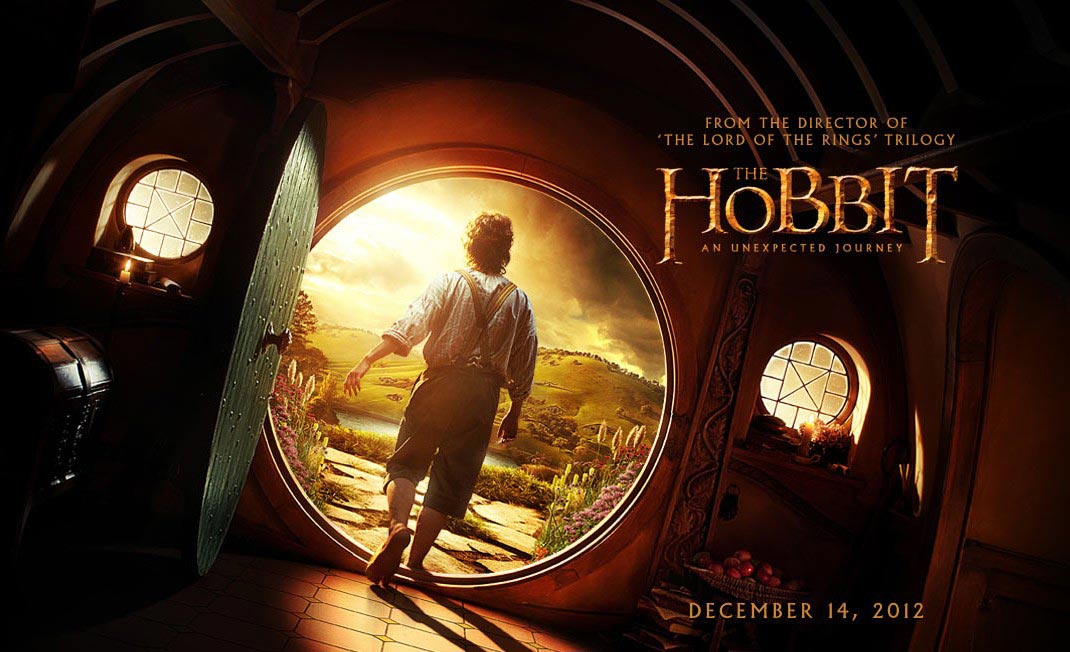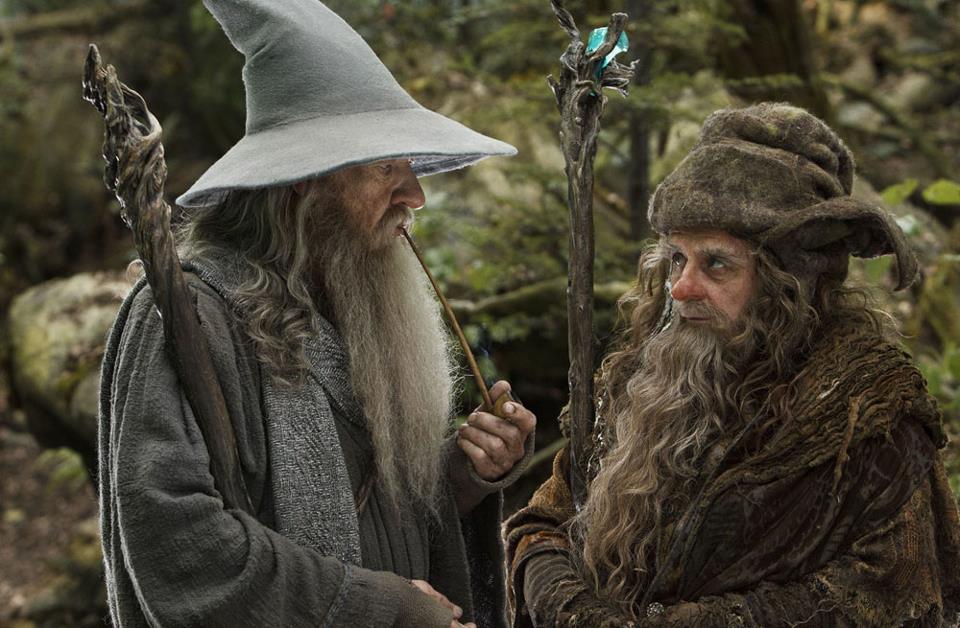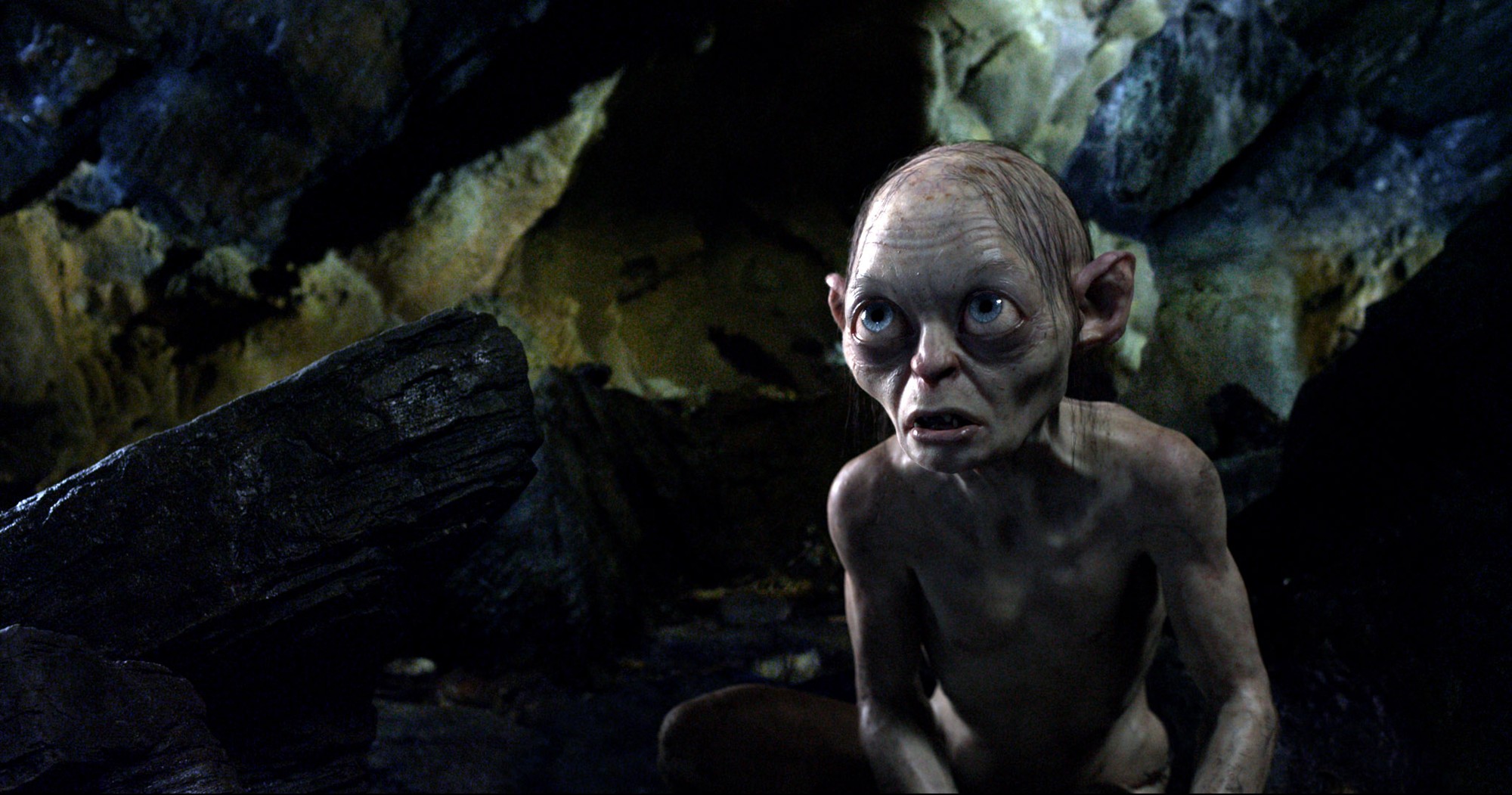"The Hobbit" Review - Sylvester McCoy Has Supersonic Bunnies... Your Argument Is Invalid!

The Hobbit - An Unexpected Journey (2012)
Before I even begin, it's important to note the level of criticism there has already been for this film. Though on IMDB users have currently ranked the film as an 8.5 it is well known that there are some extremely rabid fans of the entire Lord Of The Rings trilogy. Meanwhile, of the critics on Rotten Tomatoes, currently only 65% of them can be said to have liked the film. Admittedly much of this has been due to the advanced format by which the film is displayed.

The biggest news as the first installment of "The Hobbit" approached its release date was the highly negative reaction of the critics to the increased framerate in which the film has been filmed. As most reading this have likely already heard on several occasions by now and getting sick of hearing in every review they read, "The Hobbit" was filmed at 48 frame per second rather than 24 frames per second. The unfortunate consequence of this appears to be that the film feels like it is running at double speed, even though the action is playing at normal speed. I say this, admittedly, not as someone who has ever seen the film at 48 fps, but I did watch a version of the trailer displayed in this way and that was my impression. My own experience of the full movie was in 24 frames per second, as God intended, and the highly advanced headache-free experience which audiences have enjoyed ever since "It Came From Outer Space" (an example of the very old-fashioned technique of "3D filming") left them feeling a little peaky.
Critics insisted that, in spite of their misgivings about the new technology, the film did not live up to Peter Jackson's earlier "Lord Of The Rings" trilogy anyway. They seemed to suggest that the dwarves exhibited toilet humour, that the characters were less interesting and fleshed-out than in the other films, that the scenes in the first half are too slow-paced, and on top of all that is the assertion that the film is too damn long. In regards to the prior trilogy, I wasn't really much of a fan. I enjoyed the first film quite a lot, though I did feel like it involved an awful lot of ponderous stopping and pontificating. This I was prepared to accept because I knew it was true to the book. However, like with the relatively recent reboot of the "Star Trek" franchise, a lot of the appeal came from the possibilities opened up for a whole franchise (and we'll see next year whether the sequel to the eleventh Star Trek really carries on the franchise like it's supposed to). The second LOTR film, however, I was less able to tolerate. "The Two Towers" is my favourite of Tolkein's books. It has a number of parts which I absolutely love and the cliffhanger is brilliant. Peter Jackson consistently removes all cliffhangers in his movies of "The Lord Of the Rings", resolving the battle scene in Fellowship Of The Ring rather than finishing with the two main Hobbits escaping while all hell breaks loose around them. In the film of "The Two Towers", exciting elements at the climax of the book are simply left for the third movie, but what's more, one of the most fantastic moments from the middle of the book where a frightened and misguided king is returned to his former glory seems to turn into a cheesy exorcism. Admittedly the ponderous shots of major characters staring into the distance felt more fitting in the extended editions of the films and a one-eyed Orc general adds a great deal more drama to what, in the theatrical edition, was a pretty much interminable and seemingly endless battle scene in "Return Of The King". However, by the time I had seen these rather better paced, longer versions of the films, I had trouble judging them. Everything in them was too familiar.
I entered the cinema to see "The Hobbit" with a decidedly pessimistic view. Critics had damned the film, online reviewers had often expressed a similar view (including some who may well be reading this review themselves), the trailer which depicted serious-faced dwarves singing a sombre song made me think that this was following the same route as the previous trilogy (which irritated me), and to top it all off, that 48fps version of the trailer made the facial prosthetics of the dwarves look utterly ridiculous. In short, I was not at all sure that I would like this film.

So now is perhaps a good time to say, before you read any further, to make this important point completely clear and unambiguous, that I loved this film. This, for me, is one of the best films of the year. (I'm a number of reviews behind and my favourite of the year has yet to be reviewed, so yes, I even preferred this to "Skyfall". It's THAT good, by my reckoning.) So does that mean that the critics' claims were entirely false? Well, not exactly.
One claim that I will dismiss completely is the suggestion that the opening is not edited down properly. I will add the proviso that the one point where Frodo turns up could have been left out, but asides from that I don't think there was anything that could really have been missed. The opening shows a dramatic telling of the history of the dwarves. This information ensures we understand the precise nature of the adventure pursued by the dwarves with whom The Hobbit will later travel. There's an awful lot of reference in "The Hobbit" to Middle-Earth history of which we are left extremely ignorant and, as it turns out, giving us that history explicitly and in pretty good depth only adds to our enjoyment. The story need not have been narrated by the older Bilbo Baggins we saw in "The Lord of the Rings", but this and the brief appearance of Frodo is clearly pandering to the fans of the original trilogy and, in at least some cases it seems, this has done very little to help fans of the prior movies to accept the rather different tone of "The Hobbit".
The story of the history of the dwarves does have a problem though. As the camera rushes through dwarven caves, almost as if carried on the head of a large drunken bat, the images rush past far quicker than I could take them in and what's more the images are often blurred. This is presumably a rather unfortunate consequence of converting the 48fps down to 24fps. Still, it doesn't look too bad and this seems like far too much of a cosmetic issue to criticise the film for too heavily. Whether 48 fps catches on or not, it seems that this issue may well be tidied up in the future one way or the other.
Once we are filled in on the history, it is time to introduce Bilbo Baggins. Yes, Martin Freeman often seems to play the same sort of character. The thing is that the sort of character he normally plays IS Bilbo Baggins. What's more, his ability to play that kind of part is absolutely stunning and Freeman is on top form in this first installment of "The Hobbit". We follow the initial part of "The Hobbit", the highly memorable 'unexpected party', with not a single error. We feel The Hobbit's frustration as the dwarves slowly invade his personal space, but the comedy of the scene is also captured perfectly. What's more, in spite of such a large cast, all the characters struck me as much easier to relate to than the various Hobbits of "The Lord Of The Rings". It probably comes as no surprise to hear that Freeman as Bilbo has infinitely more depth than Elijah Wood did as Frodo. But that the whole host of dwarves managed to have more character than three Hobbits with a lot of screen time should be rather more surprising. I recognised James Nesbitt from "Five Minutes of Heaven" and (when I was younger) the tv series "Cold Feet", playing the dwarf 'Bofur'. I also recognised Aidan Turner who played the vampire from "Being Human", putting his excellent comedy skills to use as 'Kili'. Another dwarf actor I should have known was Ken Stott who has been in a number of things I have seen, not least being the detective in Danny Boyle's "Shallow Grave", but a great deal of prosthetics made him hard to recognise here. Still, I would say that all the dwarves are expertly performed.

The claims of toilet humour are not really fair in regards to the dwarves. It is part of the story of the 'unexpected party' that they should be uncouth in their behaviour. However, the nearest reference to bodily functions I can recall is some of the dwarves beltching loudly while they eat. Much closer to toilet humour is the later encounter with trolls, with a great deal of snot coming from a troll with a cold. I did not feel like the humour was overly childish. In fact, I found that the film rather perfectly captured the tone of the book. A tone which I much preferred as a reader to that found in "The Lord Of The Rings". There was no way that the unexpected party towards the beginning of the film could have been cut down. Pretty much everything that happened in that part of the film HAD to happen to be true to the spirit of the book and the whole scene is endlessly entertaining.
As for the idea that the film is over-long, I watched the film after quite a long trip by car. I was, I must admit, rather tired. Throughout most of the film my attention was carried perfectly in spite of being preceeded by irritating adverts, a trailer for Les Miserables that I thought was never going to end, and the film itself having the unusually long runtime of three hours. The one part where my eyes closed for a little was a climactic scene involving a baddie who is not technically found within the novel at all. During that scene Bilbo quickly does something heroic and unfortunately I had my eyes closed at the vital moment, leaving me confused when he was later praised. This is not a fault of the movie, but rather of my own tired state. At the beginning of the film I had not believed that I would need to pay much attention, but by this late scene I was utterly gripped and was actually annoyed to find my tiredness overtaking me.

The new baddie is known as "The Pale Orc". He is derived from a character briefly mentioned in "The Hobbit" and described in rather more detail within Tolkien texts on the history of the dwarves (and we get a flashback scene to fill us in on this), but in the original text he is a goblin, not an Orc, and he does not play a part in the adventure found in the novel of "The Hobbit". The purpose of this character is to ensure that this film has a satisfying ending by itsef rather than feeling like only an episode of a bigger story. Clearly Peter Jackson has learnt a great deal from his prior trilogy.
What IS found in the novel of "The Hobbit" is multiple references to a baddie known only as 'the necromancer'. I understand that there is some connection between Sauron and 'the necromancer', but it's never been clear to me what that connection is. Our main insight into the appearance of the necromancer within the film is another of the wizards known as "Radagast the brown". While I didn't initially recognise him, this role is played by none other than my childhood Doctor, the ever-awesome Sylvester McCoy. (If you haven't seen "Remembrance Of The Daleks" check it out now!) Sylvester McCoy has a great comic ability, but is able to combine that with seriousness where necessary (which is what makes him so great as Doctor Who, where he actually represented one of the darker portrayals of the character). Here he is playing a hermit who chooses to live with the animals and has some kind of mould growing on the side of his head. He is horrified as he sees the darkness encroaching on the land and killing various animals and somehow McCoy's performance managed to keep me on board even while he is desperately trying to heal a CGI hedgehog. Once his character is fully established the full creative dynamite of his character is at full tilt when we see him on some kind of sled made of twigs being pulled by super-fast bunnies. Perhaps being familiar with the 'racing snail' from a childhood favourite movie "The Neverending Story" made this rather easier to swallow, but I went along with this easily.

I think the silliness of "The Hobbit" suits Peter Jackson rather better than the ultra-seriousness of "Lord Of The Rings" did. Jackson was previously known for rather bizarre and silly films like the endlessly inventive zombie comedy "Braindead" and the ridiculous low budget alien invasion romp "Bad Taste". Even his highly acclaimed "Heavenly Creatures" goes a bit ridiculous at one point, betraying the bizarre humour of its director. Peter Jackson has a great flair for the kind of comedy which is present throughout "The Hobbit" and as much as I was so keen to see Guillermo Del Toro make this film, I feel I must admit that "The Hobbit" was the film Peter Jackson was born to make. Far from being the lowest quality of the film franchise so far, for me this suggests that the "The Hobbit" films may well redeem the "Lord Of The Rings" films for me. Finally I may be able to accept the extended versions as films linked with the excellent "The Hobbit" series rather than improved versions of 'those disappointing films I saw in the cinema'.
One last element I must mention is Gollum. Yes, of course Serkis is great. He's always great. However, I had some misgivings about the way the scene with Gollum brings back that multiple personality thing from the Lord Of The Rings films. It's not clear that the Lord Of The Rings books really portray Gollum as having mulitiple personalities. It's more like he's conflicted. Gollum's multiple personalities suggest a weakness or softness that I would not expect Bilbo to see. I remember Gollum in "The Hobbit" being frightening and the expression of a softer side detracts from that somewhat.... Except that the scene has always involved Gollum getting excited about riddles and I must admit the mixture between the excitement about riddles and the threats to eat Bilbo are actually very well represented by the multiple personality. So as much as this portrayal of Gollum somewhat annoyed me in "The Two Towers", I can admit that it works quite well here.

The Hobbit is one of the best films of the year. It is an absolute masterpiece. It is genuinely very funny, it exhibits wonderful performances all round, the characters are all very well-defined and the fantasy elements of the story are depicted perfectly. I do not know why anyone would want to criticise this in the way many have. It was a wonderful cinematic experience and in the 24fps 2D form in which I saw it, I was quite simply blown away - and I can't really say that about the theatrical versions of either "The Two Towers" or "Return Of The King".
A+